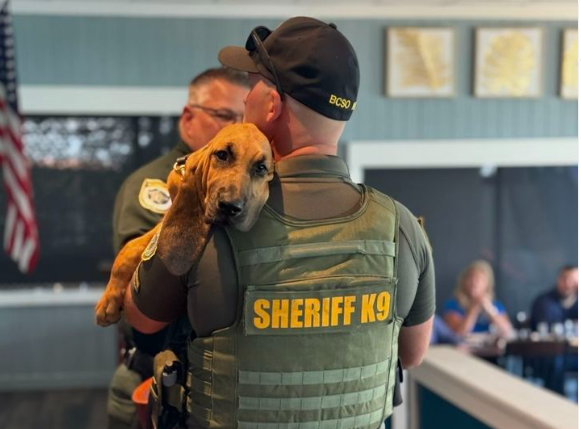
A bittersweet blend of police canine stories has recently steadily populated my news feed. Nothing new. Canine cops are always worthy of a new view, given all the diligent crimefighting, people-saving, skills demonstrations, and public relations scores they chalk up, all rewarded with a fave chew toy after the many captivating triumphs they achieve.
American policing incorporates highly trained and superbly keen-sensed dogs in the realm of law enforcement strategies and tactics. Heck, even training to deploy from police choppers, land on all fours, and rocket toward bad actors before they victimize any further is part of the magnificent makeup.
Manifestations are evident in the dynamic duos comprising human handlers and canine cops who complement one another in public safety objectives.
Ever see a police dog soon after securing another victory in the fight against crime? Elation! They exude devotion to their law enforcement handlers who, in turn, copiously praise and revere the paws in policing.

(Courtesy of FurFriends3.)
Look at any footage depicting police canine teams in action, and you will see how attuned they are to each other.
Their successes culminate in high propulsion tail wags and tons of verbal Attaboys, ordinarily followed by a handler providing the super sniffer a treat such as a Kong chew toy or novel edible for stellar police work, as usual.
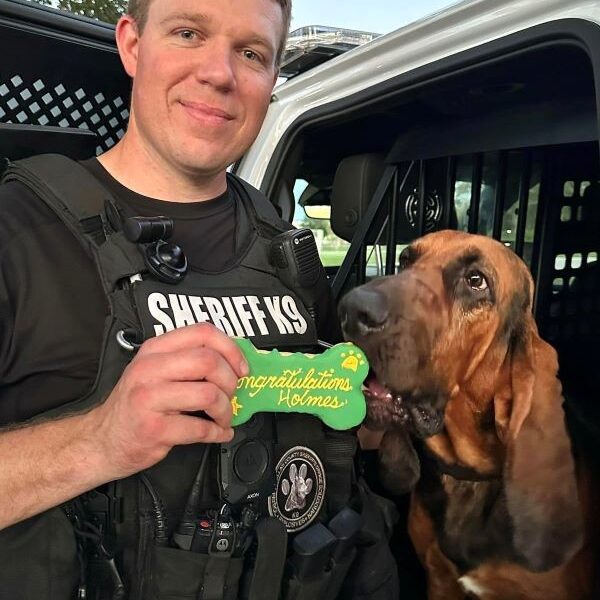
(Photo courtesy of the Pinellas County Sheriff’s Office.)
It just never gets old! Watching police canine teams deploy and swiftly score gold medals for public safety feats gives goosebumps…good ones.
There is particular pride in law enforcement officers and their diehard dogs that form formidable partnerships, with nuances that stand out.
In training sessions (pre-established and impromptu), you’ll invariably notice the acute attention police dogs pay to their handlers, highly cognizant of the latter’s every physical gesture and vocal cue, following through with an admirable prowess for accomplishing every mission.
Tons of training galvanize canine teams…
“What goes into training a K-9? Quite a bit. Going through K-9 school is often described as an extremely grueling experience because it doesn’t end when your shift is over. Since PCSO K-9s live with their handlers, work comes home with you,” said a Pinellas County, Florida, sheriff’s office spokesperson.
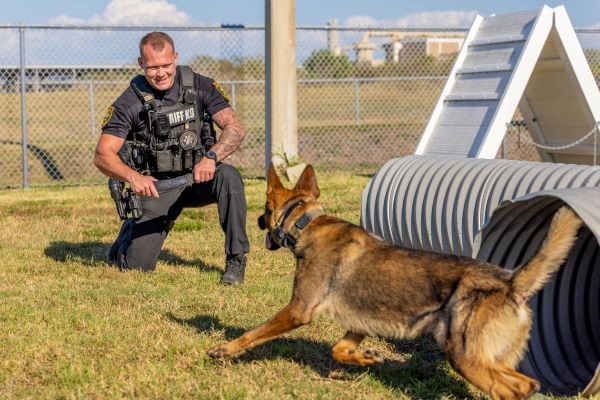
(Photo courtesy of the Pinellas County Sheriff’s Office.)
I mentioned impromptu training with police dogs…
Besides the state-mandated police canine courses of training all dogs are required to undergo for attainment of certification(s) to deploy as bona fide law enforcement service animals used to combat fleet-footed criminals, canine unit handlers often spontaneously spur additional training.
On midnight shift, whenever “down time” permitted, my squad members would serve in role-playing scenarios involving our cadre of canines, keeping them sharp and enabling patrol officers to glean how canine teams employ skills…maybe pick up some German words along the trek.
Often training for team cohesion and ultra preparedness, our officers would rotate turns dressing up in the infamous “bite suit,” serving as a “bad guy” in a skit scripted by the canine handler.
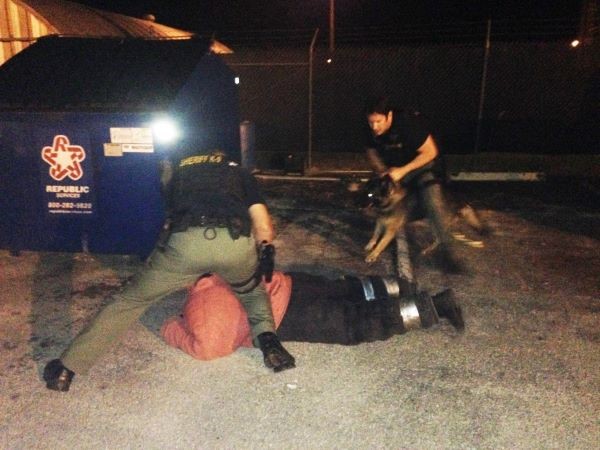
(Photo courtesy of the Pasco County Sheriff’s Office.)
Afterward, we’d debrief on the plot of land chosen by the canine handler, where they wanted to roll out the exercise, evaluating strengths and potential weaknesses, putting forth what-ifs while also heralding the solid outcomes, the dogs being revered for their role in dedication to duty and partnerships.
No one likes the bite suit (especially not during the summer months outdoors) but everyone marvels at the diligence of the dogs performing police work.
Given the sweltering temperatures experienced during summer months, police canine handlers are ever mindful of their furry partners pushing through the intense heat without sacrificing the drive to catch fleeing bad guys.
In Texas, the Frisco Police Department’s K9s wear “boots” to protect them from hot asphalt or concrete pathways without slowing down the requisite pace of chasing bad guys.
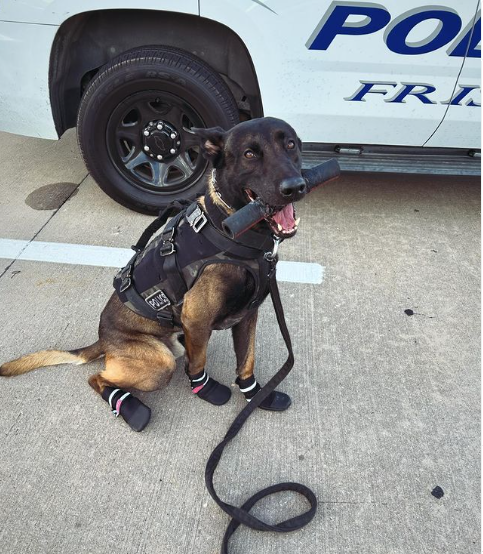
(Photo courtesy of the Frisco Police Department.)
Per a Frisco PD canine officer, “Triple digits in Texas won’t stop ‘Amigo’ from doing his job. Amigo’s stylish shoes help keep his feet safe from the sizzling Texas concrete and his @k9storminc vest keeps that infamous Texas sun off his fur.”
That’s just one of a litany of examples of law enforcement agencies looking out for their canines doing the job.
Respectfully, some police canines are geared toward providing therapy instead of crime-fighting and incidental bites. The cops at the Eau Claire Police Department provided a demonstration of this variation among law enforcement agency service animals and their particular traits.
Given the increasing woes endured by cops, engendering officer wellness programs that involve therapy dogs dedicated to all police personnel, the relaxed postures and smiles on the faces of police employees is a testament to how therapy dogs are revered in the realms of human psyches and mental health in a profession that incessantly delivers surreal experiences of the macabre kind.
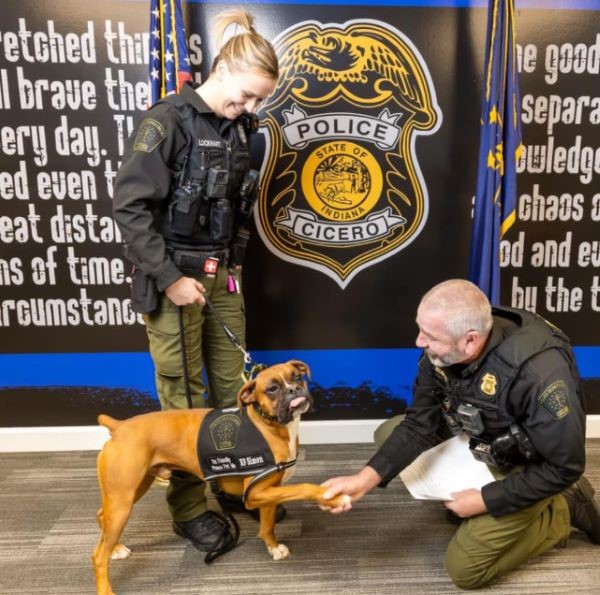
(Photo courtesy of the Cicero Police Department.)
Cicero, Indiana, police personnel, and the citizens they serve, recently added the department’s first “comfort dog,” a boxer named Simon:
“Simon is a 2-year-old Boxer who is certified through the Alliance of Therapy Dogs and has his AKC Canine Good Citizen title. He is not your average Police K9 that the public is not allowed to interact with; in fact, he is the polar opposite and is here for all the pats.
“Simon has the very important job of providing comfort and unconditional love to the citizens of Cicero. He will also assist our Officers and other first responders in coping with the stressful situations they frequently encounter.
“His tongue doesn’t always fit in his head, but we think that makes him even cuter. Simon is obsessed with tennis balls, will work for food, and gives the best hugs ever.
“Simon is owned, trained, and certified by his handler, Officer Lockhart, and he and his handler both serve the community on a volunteer basis. If you see them out and about, please say hello! Simon gets sad if he doesn’t meet a quota of at least 10 new friends a shift.”
That last part sounds like “Simon says…”
Naturally, the course of police canine employed for distinct duties also comes to an end: Retirement.
The Retired Police Canine Foundation (RPCF), a 501(c)(3) non-profit organization, chronicles service dogs employed in law enforcement that have performed well and earned retirement, comfortably in the loving homes of the cops who revered them throughout certified police service years.
“Law enforcement dogs provide our communities and our families with unmatched protection from criminals and terrorists. With their incredible sense of smell, these dogs are the most effective method we have to detect explosives, guns, or nuclear material being smuggled into the US by terrorists. These dogs can catch arsonists, find illegal drugs, have detected tons of illegal drugs and dangerous agricultural products from being smuggled across our borders. These dogs also apprehend thousands of criminals every year and guard sensitive government buildings,” the RPCF website stated.
Yet, harping on all the wonderful work and dutiful deeds police dogs contribute segues to retirement and the inherent costs neither agencies nor handlers can easily afford. Reverently, the fine folks at RPCF address monetary shortfalls by receiving donations for disbursement to officers so that the dog’s well-earned lounge time is supported by funds to afford veterinary care, food supplies, and household kennel subsidies.
Indeed, one of the best crime-fighting tools law enforcement agencies have in their arsenal is the canine unit whose partnership of dogs/humans performs astoundingly well in various ways, especially following the nose wherever it goes.
We close with words from the Sarasota Sheriff’s Office, underscoring today’s topic and how police canines are so loved and revered:
“Though they are very different from your average pet, they do live with a family and do the normal things that pets do: they play catch with a ball, swim in the pool, and run around with other pets in their household. We are grateful for the hard work of these K-9 deputies and are happy to see how much love they receive when they get to be ‘pets’ on their days off.”
“Everyone thinks they have the best dog. And none of them are wrong.” – W.R. Purche
Make a difference. Support the NPA